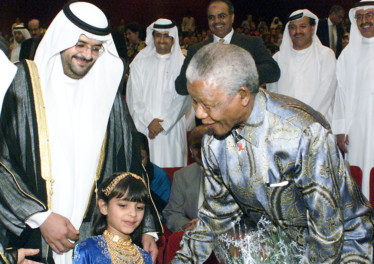
Zimbabwe-born Roger Wilkinson, 51, describes the day Nelson Mandela took to the podium at the American University of Sharjah (AUS) on May 26, 2001. “You could have heard a pin drop, not only out of great respect for the man but to hear every word he had to say,” he recalls.
Wilkinson was among those who attended a lecture Mandela presented on the topic, Education: Present and Future Challenges, at the AUS. “He spoke of the importance of family and the similarity between the Arab and African culture regarding family values, very eloquently and simply, yet deeply inspirationally,” says Wilkinson.
As he made his way out at the end of the lecture, Mandela was surrounded by a mob of people, but that didn’t deter Wilkinson. “I noticed a podium near the door he was to exit, so stood by it and waited. Sure enough he came over and after he signed the visitor’s book, turned towards me and extended his hand.
“I shook his hand and along with his warm handgrip and huge smile I immediately knew that this was the greatest moment of my life,” he says.
Lorraine Thomson, 53, a Dubai-based primary school teaching assistant from New Zealand, says, “I was in awe of the man. I was high up in the seating plan of the auditorium and looking down at the podium. I longed to meet him.”
Thomson recalls that when Mandela finished speaking he walked down the aisle to the exit. She came down from her seat to the bottom of the stairs just as he walked past her carrying his stick.
“I didn’t know what else to do to prevent him from going further, so I tapped him on the shoulder. He stopped and turned to face me. I didn’t know what else to say except the truth which was ‘We all love you” and he said to me, ‘It’s very nice to meet you.’ I will never forget that,” says Thomson.
Taryam Hasan Qayed Al Subaihi, 34, Director of Corporate Communications at Taqa in Abu Dhabi, says, “Although this was his first visit he had identified the positive aspects of our history, art and culture and related it to life back home in South Africa.
“I was completely inspired by the man, a visionary leader who gave his all to improving the lives of his people,” the Emirati says, and hopes that Mandela’s inspirational leadership continues to influence the people of South Africa, particularly those in government.
Also at the lecture was Farid Alvie, Content Manager, AUS. “I have not witnessed a longer standing ovation. It was truly a privilege to be a part of that moment.”
Many South African expats in the UAE also spoke to GN Focus of Mandela’s importance.
“Growing up in Apartheid South Africa in the 1970s and 1980s as a privileged white, I was one of the brainwashed minority who had very little idea of or interest in the politics of the day. Now somewhat greyer and slightly more educated, I realise how much we all owe to Nelson Mandela,” says 48-year-old pilot Mike Pfeifer.
“He was the epitome of an excellent leader because instead of telling South Africans what to do, he showed us by his actions.”
Shaun Marais, 32, a restaurant operations manager, in Dubai, says, “There was hope in South Africa when Mandela was still alive, but as he started becoming more ill the government started becoming more corrupt. We always knew that when he died things would not be good for the white South African and that is becoming more apparent.”
“Even though society created this symbol of hope, freedom and leadership, I have an indifferent perception of Mandela, mainly due to the generation gap,” says Student Jenna Pfeifer, 17.
“If I had witnessed the same struggles as my parents, then his spirit would be more appreciated by people like me.”
Eben Botha, 28, is a Mirdif resident. He says, “I am extremely proud to share my nationality with one of the most respected humanitarian figures in recent history. The impact that he had on both South African and global history is immeasurable.”
“Nelson Mandela was and still is a big role model to me because he was not afraid to stand up for his beliefs. The legacy he left behind was that you should always believe in yourself, stand up for what you believe and always to be true to yourself,” says Bianca Esterhuizen, 24, a spa therapist with the Anantara hotel group in the UAE.













